Nigerian traditional rulers
Nigerian traditional rulers often derive their titles from the rulers of independent states or communities that existed before the formation of modern Nigeria. Although they do not have formal political power, in many cases they continue to command respect from their people and have considerable influence.[1]
Though their bearers usually maintain the monarchical styles and titles of their sovereign ancestors, both their independent activities and their relations with the central and regional governments of Nigeria are closer in substance to those of the high nobility of old Europe than to those of actual reigning monarchs.
Pre-colonial period

Modern Nigeria encompasses lands traditionally occupied by highly diverse ethnic groups with very different languages and traditions. In broad terms, the southeast was occupied mainly by Igbo, the Niger Delta by Edo and Igbo related people, the southwest by Yoruba and related people and the north by Hausa and Fulani people, with a complex intermingling of different ethnic groups in the Middle Belt between north and south. In total there were (and are) more than 200 distinct ethnic groups.[2]
Before the arrival of the British in the late 19th century, the history of the area was turbulent, with periods when empires such as those of Oyo, Benin, Kanem-Bornu and Sokoto gained control over large areas, and other periods when the states were more fragmented.[3] Although political structures differed widely between different ethnic groups, it was common for each town or collection of towns to have a recognized ruler, who might in turn be subordinate to the ruler of a larger polity. Thus the Sokoto caliphate was divided into emirates, with the emirs loosely subordinate to the Sultan of Sokoto, although at times acting as independent rulers.[4]
Colonial era
Europeans had long traded with the coastal states, primarily exchanging cotton and other manufactured goods for slaves and palm oil products at centers such as Calabar, Bonny and Lagos. The Niger Coast Protectorate was established in 1891 holding a small area along the coast. During the period 1879–1900 the Royal Niger Company made a concerted effort to take control of the interior, using disciplined troops armed with the Maxim gun, and making treaties of "protection" with the local rulers. The company's territory was sold to the British government in 1900, with the southern region merged with the Niger Coast Protectorate to become the Southern Nigeria Protectorate and the Northern Nigeria Protectorate remaining separate. In 1914 the two were merged into the Colony and Protectorate of Nigeria, with roughly the same boundaries as the modern state of Nigeria.[5][6]
The first British High Commissioner for Northern Nigeria, Lord Frederick Lugard, tried to rule through the traditional rulers, and this approach was later extended to the south. Lugard's successor Hugh Clifford left this system in place in the north, where the emirate system had long traditions, but introduced a legislative council with some elected members in the south, relegating the traditional rulers to mainly symbolic roles.[7] Over time, the relationship between the colonial administration and the traditional rulers evolved. For example, the Tiv people, at the time the fourth largest ethnic group in the country, had always been extremely decentralized and therefore had no paramount ruler. The British created the office of Tor Tiv in 1947, appointing Makere Dzakpe as the first holder of this title, in order to have a "traditional ruler" to speak for the Tiv people.[8]
Independent Nigeria
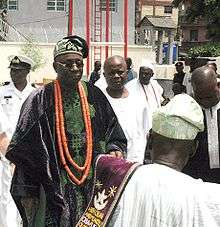
With independence in 1960, followed by alternating democratic and military governments, the status of the traditional rulers evolved even further. In the north, the emirs finally lost power to the government administration, though said administration was often staffed by traditional notables. Where rulers had previously acquired office strictly through inheritance or through appointment by a council of elders, the government now increasingly became involved in the succession. Thus, in May 1994, the military ruler General Sani Abacha deposed Awwal Ibrahim, Sarkin Suleja, although he was subsequently reinstated in January 2000.[9][10]
In some cases, the government has merged or split traditional domains. For example, there had been two rulers of the Efik people in the area around Calabar, but in December 1970 it was agreed to combine the office into a single one that was to be held by a ruler known as the Obong.[11] When Yobe State was created there were just four emirates, but in January 2000 the state governor Bukar Abba Ibrahim restructured the state into 13.[12] The government has maintained colonial classifications. Thus when Kwara State governor Bukola Saraki appointed three new monarchs in August 2010, the new Emir of Kaiama was designated a first class traditional ruler while the Onigosun of Igosun and Alaran of Aran-Orin were designated third class monarchs.[13]
Traditional rulers today are still highly respected in many communities, and have considerable political and economic influence.
Although they have no formal role in the democratic structure, there is intense competition for royal seats amongst the finite pool of eligible dynasts.[1] The rulers can also award traditional or honorary titles within the Nigerian chieftaincy system. These titles come with ex officio positions in their "administrations", and wealthy businessmen and politicians often place great value in acquiring such titles.[14]
The rulers play useful roles in mediating between the people and the state, enhancing national identity, resolving minor conflicts and providing an institutional safety-valve for often inadequate state bureaucracies.[15] One reason for their influence may be that the people of many ethnic groups have limited ability to communicate in the official English language, so the traditional ruler serves as an interpreter and spokesperson.[16] By June 2010, Akwa Ibom State had 116 traditional rulers with official certificates from the state. They had received new cars on their appointment, among other perks. The chairman of the Akwa Ibom council of Chiefs said that in return, the traditional fathers were responsible for preventing robberies and kidnappings in their domains.[17]
Titles
As there are 521 different languages native to Nigeria, there are many titles for traditional rulers.
In the northern Muslim states, Emir is commonly used in the English language, but names in the local languages include Sarki, Shehu, Mai, Etsu and Lamido. In the states in Northern Nigeria that are not predominantly Muslim, different titles are held. An example is the Aku Uka of the Kwararafa kingdom, traditional ruler of the Jukun, whose seat is in Wukari, Taraba state.
Oba is the title of the Benin Kingdom's paramount ruler in Edo State. Enogie (plural enigie) and Okao (plural ikao) are ascribed to his dukes and viceroys within the Benin Kingdom, while Odionwere is ascribed to his governors or senior elders. In practice, enigie are not installed in communities with ikao, as they are both traditional rulers and representatives of the Oba, charged with the administration of their respective communities.
Onojie is used by the Esan peoples to refer to their various rulers in Edo State, while the Afamai people use Otaru and Okwokpellagbe. Other titles are also used.
Among the Urhobos and Isokos of Delta State, the general title used is Ovie. Some clans use related titles however, such as Orodje, Orosuen, Ohworode, Odion-Ologbo, and Odio r'Ode.
Obong is likewise used by the Efik, Ibibio and Annang peoples of Cross River and Akwa Ibom States.
Oba is also used by the Yoruba peoples to refer to their various rulers, though other titles such as Ooni, Alake, Alaafin, Awujale, Olomu, Akarigbo, Orangun, Olu'wo, Eleko, Olumushin and Eburu are also used, specific to the people and/or place ruled.
In the southeast, Obi, Igwe and Eze are common titles among Igbo rulers, but again there are many local titles amongst their immediate neighbours, such as the Ijaw's Amanyanabo.[18]
Gallery
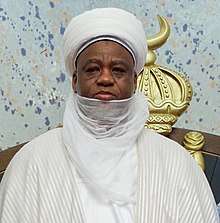 Sa'adu Abubakar, Sultan of Sokoto and Sarkin Musulmi of Nigeria, current Co-Chair of the National Council of Traditional Rulers
Sa'adu Abubakar, Sultan of Sokoto and Sarkin Musulmi of Nigeria, current Co-Chair of the National Council of Traditional Rulers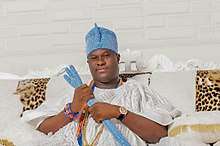 Adeyeye Enitan Ogunwusi, Ooni of Ife, current Co-Chair of the National Council of Traditional Rulers
Adeyeye Enitan Ogunwusi, Ooni of Ife, current Co-Chair of the National Council of Traditional Rulers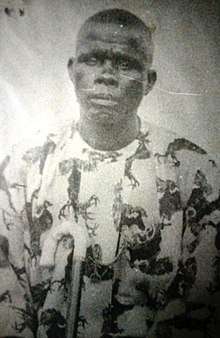
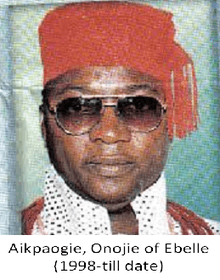 Aikpaogie, Onojie of Ebelle
Aikpaogie, Onojie of Ebelle- Idia, Queen Mother of Benin
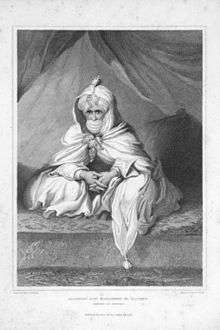 Muhammad al-Amin al-Kanemi, Shehu of Borno
Muhammad al-Amin al-Kanemi, Shehu of Borno Oduduwa, Ooni of Ife
Oduduwa, Ooni of Ife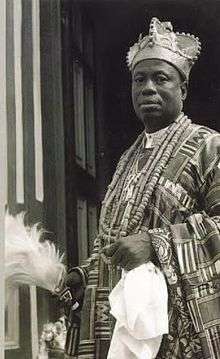 Sir Adeniji Adele K.B.E., Oba of Lagos
Sir Adeniji Adele K.B.E., Oba of Lagos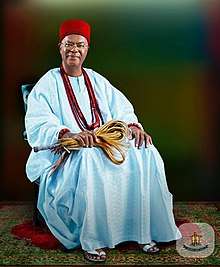
- Samuel Akisanya, Odemo of Isara


 Nana Olomu, Paramount Chief of the Itsekiri
Nana Olomu, Paramount Chief of the Itsekiri Muhammadu Sanusi II, Emir of Kano
Muhammadu Sanusi II, Emir of Kano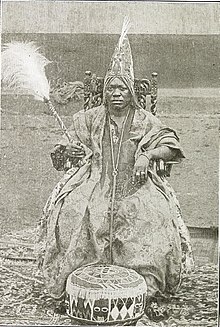 Sir Adesoji Aderemi K.C.M.G., Ooni of Ife
Sir Adesoji Aderemi K.C.M.G., Ooni of Ife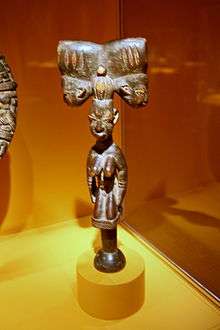
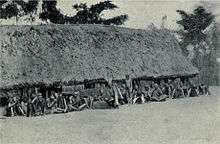 Obalike, Eze Nri of Nri (ringing the royal bell)
Obalike, Eze Nri of Nri (ringing the royal bell) Abubakar Ibn Umar Garbai El-Kanemi, Shehu of Borno
Abubakar Ibn Umar Garbai El-Kanemi, Shehu of Borno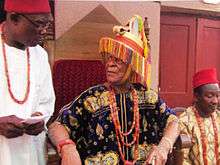
 Olokun, Queen Consort of Ife
Olokun, Queen Consort of Ife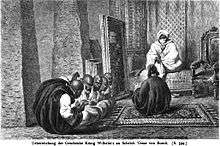 Umar, Shehu of Borno
Umar, Shehu of Borno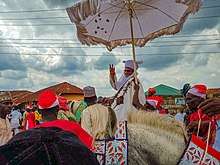 Yahaya Abubakar, Etsu Nupe of Bida
Yahaya Abubakar, Etsu Nupe of Bida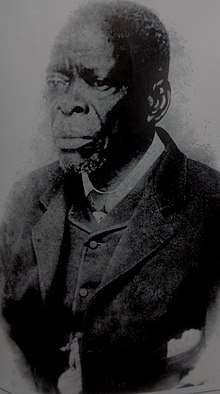 Ajimoko I, Owa of Ijeshaland
Ajimoko I, Owa of Ijeshaland Chukwuemeka Eri, Eze of Aguleri
Chukwuemeka Eri, Eze of Aguleri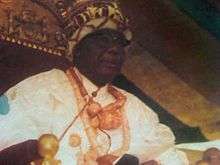 Ezeolisa Allagoa, Amanyanaboh of Nembe
Ezeolisa Allagoa, Amanyanaboh of Nembe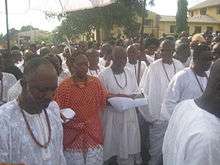 Folagbade Olateru Olagbegi III, Olowo of Owo (in the vest of red coral beads)
Folagbade Olateru Olagbegi III, Olowo of Owo (in the vest of red coral beads)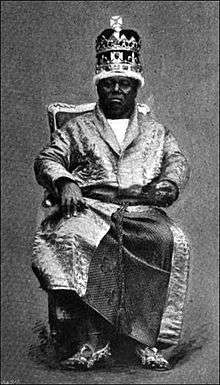 Eyamba IX, Obong of Duke Town
Eyamba IX, Obong of Duke Town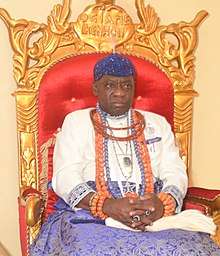 Ikenwoli Godfrey Emiko, Olu of Warri
Ikenwoli Godfrey Emiko, Olu of Warri Lamidi Adeyemi, Alaafin of Oyo (on the right) and Jimoh Olajide Titiloye, Olu of Igboora
Lamidi Adeyemi, Alaafin of Oyo (on the right) and Jimoh Olajide Titiloye, Olu of Igboora.jpg) Ibrahim Usman Jibril, Emir of Nasarawa
Ibrahim Usman Jibril, Emir of Nasarawa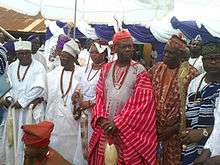 Kofoworola Oladoyinbo Ojomo, Ojomo Oluda of Ijebu, Owo (in red) in the company of some of his fellow chiefs
Kofoworola Oladoyinbo Ojomo, Ojomo Oluda of Ijebu, Owo (in red) in the company of some of his fellow chiefs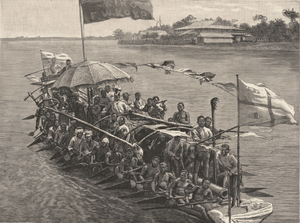 William Koko, Amanyanaboh of Nembe in his war canoe (seated under the umbrella)
William Koko, Amanyanaboh of Nembe in his war canoe (seated under the umbrella)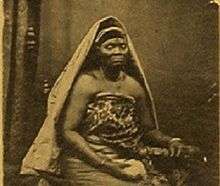
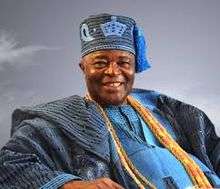 Adedotun Aremu Gbadebo III, Alake of Egbaland
Adedotun Aremu Gbadebo III, Alake of Egbaland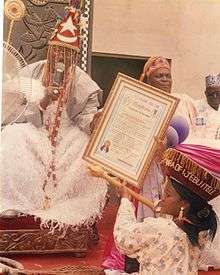
.jpg) Ovonramwen, Oba of Benin and his wives Queen Egbe (on the left) and Queen Aighobahi (on the right)
Ovonramwen, Oba of Benin and his wives Queen Egbe (on the left) and Queen Aighobahi (on the right)
See also
- History of Nigeria
- List of Nigerian traditional states
- Nigerian chieftaincy
- Nigerian heraldry
- Royal regalia in Nigeria
References
- Oma Djebah; Collins Edomaruse; Lanre Issa-Onilu; Agaju Madugba; Oke Epia (31 August 2003). "Royal Fathers: Their Power, Influence, Relevance..." BNW News. Retrieved 3 September 2010.
- "Background Note: Nigeria". U.S. State Department. Retrieved 3 September 2010.
- Thornton, John K. (1999). Warfare in Atlantic Africa 1500–1800. London and New York: Routledge. ISBN 1-85728-393-7.
- Johnston, Hugh A.S. (1967). Fulani Empire of Sokoto. Oxford University Press. ISBN 0-19-215428-1.
- Thomas Pakenham (1991). The scramble for Africa, 1876–1912. Random House. ISBN 0-394-51576-5.
- Olayemi Akinwumi (2002). The colonial contest for the Nigerian region, 1884–1900: a history of the German participation. LIT Verlag Münster. ISBN 3-8258-6197-X.
- "A Country Study: Nigeria". The Library of Congress. Retrieved 25 March 2010.
- Billy J. Dudley (1968). Parties and politics in northern Nigeria. Routledge. p. 92. ISBN 0-7146-1658-3.
- Tony Orilade (3 April 2000). "Suleja Goes Up In Smoke Again". The News (Lagos). Retrieved 25 March 2010.
- "Traditional States of Nigeria". Retrieved 25 March 2010.
- "Culture & Society". Creek Town (Iboku Esit Edik) Foundation. Archived from the original on 30 October 2010. Retrieved 3 September 2010.
- Ola Amupitan (August 2002). "Potiskum's Challenge to Damaturu as Yobe Capital". Vanguard. Archived from the original on 11 July 2011. Retrieved 3 September 2010.
- "Saraki Approves Appointment Of 3 New Monarchs". Nigerian Observer. 19 August 2010. Archived from the original on 14 July 2011. Retrieved 3 September 2010.
- Chris Ewokor (1 August 2007). "Nigerians go crazy for a title". BBC News. Retrieved 3 September 2010.
- William F. S. Miles (Fall 1993). "Traditional rulers and development administration: Chieftaincy in Niger, Nigeria, and Vanuatu". Studies in Comparative International Development. 28 (3): 31–50. doi:10.1007/BF02687120.
- Louis Brenner (1996). "Beyond the Stream: Islam and Society in a West African Town by Robert Launay". Journal of the International African Institute. Edinburgh University Press. 66 (2): 304–307. doi:10.2307/1161326. JSTOR 1161326.
- "AKSG Recognises 116 Traditional Rulers In Three Years, Gives Out Cars and Certificates of Recognition". Akwa Ibom State Government. 9 July 2010. Retrieved 3 September 2010.
- "Traditional States of Nigeria". World Statesmen. Retrieved 3 September 2010.
External links
- Dan Isaacs (28 September 2010). "Nigeria's emirs: Power behind the throne". BBC News. Retrieved 29 September 2010.
- "In pictures: Country of kings, Nigeria's many monarchs". BBC. 13 October 2013.
- Orjinmo, Nduka (22 March 2020). "How Nigeria's kings lost their power". BBC.

